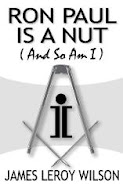How a person answers this question, may tell a lot about how he or she would answer others. Or maybe not. The answers are not original with me, so I'd suggest googling to find out more.In any case, here is my One Question Political Quiz:
What does CIA stand for?
a) Central Intelligence Agency. It is concerned with gathering information related to the security and interests of the United States.
b) Christ In Action. The purpose of American foreign policy is to make the world a better place. The CIA, while admittedy having to engage in some unpleasant business, is generally a force for good because it seeks out and supports pro-democracy and pro-liberty individuals fighting oppression throughout the world.
c) Capitalist Imperialism Advancement. The CIA props up regimes friendly to American commercial interests, and seeks to overthrow those which are not so friendly. It matters little whether these friends are dictators or dissenters.
d) The Cocaine Importation Agency. The CIA is its own animal working for its own interests and enrichment, even when they are at odds with American law and policy. It is a crime syndicate, but a very sinister one obsessed with the occult and the paranormal, and the world's chief facilitator of everything from heroin production to child pornography. The CIA rules the world through assassination, manufactured crises that keep the masses fearful and obedient, and blackmail of politicians.
I suspect most people, if given the option, would say that the correct answer is e, "all of the above." The CIA is an umbrella under which well-meaning patriots, ideological zealots, cynical but power-mad opportunists, and criminal conspirators all work - sometimes together, sometimes at cross-purposes.
But leaving the "e" out, the question becomes, who's in the driver's seat at the CIA? The a, b, c, or d types? Those who claim a, b, or c would view the CIA as the outgrowth of politics in general: a conflct among various ideologies and economic interests. Those who lean toward "d" are called conspiracy theorists and are implored to produce the one thing that, by definition, they can't: hard evidence. That evidence has been covered up leaving just circumstantial evidence with which to connect the dots.
I believe in "d." I believe there is more to what's going on than a conflict of values or errors in strategic planning. I can't prove it, and few others whom I may research and link to can conclusively prove it either. And I don't think it's necessary. I don't need "d" to explain the 9-11 attacks, which were to be expected in light of our foreign policy. I don't need "d" to explain why the Iraq war would fail, or why government doesn't work.
But "d" is always there, in the back of my mind. If I single out a politician for particularly harsh criticism, I may sound like I'm attacking his personal ethics or intelligence. But deep down I probably will suspect that he's either in on some grave conspiracy, or he's being threatened or blackmailed. I rarely mention it, but I suspect it.
After all, there's more to reason than just hard evidence, and there's more to belief and judgment than mere reason. We continue to receive information that the logical mind can't recognize, or can't sort. Our guts receive information. So does the heart. And the intuitive mind. We see things we can't explain, but that doesn't make them any less real.
James Leroy Wilson's one-man magazine.
Subscribe to:
Post Comments (Atom)




Jim,
ReplyDeleteI'd answer your one question quiz if I wasn't so afraid of extraordinary rendition.